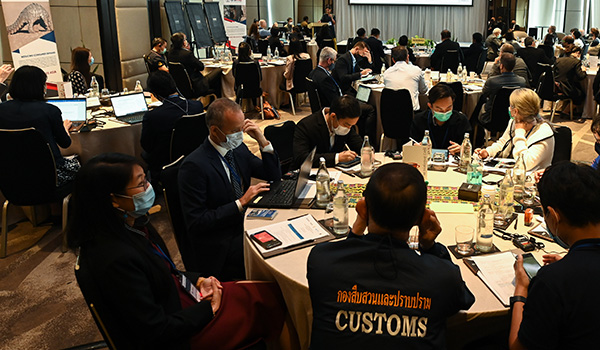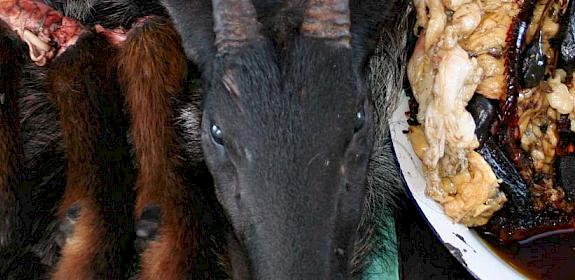Thai maritime stakeholders join forces in tackling the illegal wildlife trade
Bangkok, Thailand, 12th March 2021 -- Seventy-six representatives from Thai seaports and related maritime supply chain stakeholders gathered in a two-day face-to-face workshop to foster public-private partnerships and knowledge sharing to improve capacity and systems in combating wildlife crime through containerized shipping.
 The workshop, organised by Thai Customs, the United Nations Office on Drugs and Crime (UNODC), United States Agency for International Development (USAID) Wildlife Asia, TRAFFIC and WWF took place in Bangkok between March 9th and 10th. The event brought together 33 organisations: representatives from nine government departments (including the Thai Customs, environmental police and CITES management authority), 14 development partners and 10 private sector entities, mainly from shipping and freight companies.
The workshop, organised by Thai Customs, the United Nations Office on Drugs and Crime (UNODC), United States Agency for International Development (USAID) Wildlife Asia, TRAFFIC and WWF took place in Bangkok between March 9th and 10th. The event brought together 33 organisations: representatives from nine government departments (including the Thai Customs, environmental police and CITES management authority), 14 development partners and 10 private sector entities, mainly from shipping and freight companies.
“Governments cannot win this battle alone. Public-Private Partnerships are the only way to seriously tackle the traffickers that move wildlife products across borders and jurisdictions,” said Chaiyut Kumkun, Principal Advisor on Customs Control Development for Director-General of Thai Customs.
The workshop focused on deepening the participants' understanding of the risks wildlife trafficking presents to maritime supply chains and their operators; sharing best practices and identifying interventions which will address existing gaps in systems and processes that are exposing the industry to transnational traffickers’ nefarious operations. Information sharing, cargo risk assessment, shipper due diligence, and legislation were some of the priority areas identified that will guide strategic action to tackle the illicit trade in the maritime supply chain.
"With diverse fields of expertise in the room, everyone's contribution has been extremely insightful to understanding challenges and opportunities to identify anti-trafficking solutions for all sectors," said Anat Machima, Chief Operating Officer, Hutchison Ports Thailand and Chairman of the Thai International Cargo and Container Terminals Association.
“This constructive multi-stakeholder event is a meaningful contribution to the efforts of the Thai government in leveraging the seriousness of the issue across all the sectors involved and vulnerable to this illicit business,” said Pimpavadee Phaholyothin, CEO, WWF-Thailand.
Due to its rich biodiversity, cultural beliefs and modern transport infrastructures, Thailand plays an important role as source, transit and consumer country for a wide range of protected plant and animal species. Home of the endangered Siamese rosewood, illegal shipments of this highly prized timber used for high-end furniture in East Asia continue to be intercepted at the ports on their way out of the country. In 2015, over 10 tonnes of African elephant ivory were seized in containerized cargo that used Thailand as a transit point. With the aviation sector disrupted and national borders still closed due to the COVID-19 pandemic, it is predicted that traffickers will increasingly shift to maritime shipments, therefore enhanced vigilance should be exercised.
Giovanni Broussard, Regional Coordinator for the UNODC Wildlife and Forest Crime Programme, highlighted, “The maritime supply chain is at the centre of the wildlife trafficking issue, as organized criminal groups exploit any crack in the system to conduct successfully their criminal operations. They look for a crack and if they don’t find one, they create it, through deception, fraud and corruption”.
It takes a network to dismantle a network, and with this workshop we took a big step forward in that direction."
Monica Zavagli, TRAFFIC Programme Manager.
The workshop in Thailand was the first of its kind for Southeast Asia. Similar events aimed at tackling wildlife trafficking at ports and along international maritime supply chains took place in African countries 2019 in Tanzania (add hyperlink https://www.traffic.org/publications/reports/countering-wildlife-trafficking-through-tanzanias-ports-workshop-proceedings/) and Kenya (https://www.traffic.org/publications/reports/workshop-proceedings-countering-wildlife-trafficking-through-kenyas-ports/) and more are planned in other high-risk countries in the near future.
Notes:
The workshop was supported by the financial contribution of USAID Wildlife Asia, WWF and UNODC.
About USAID Wildlife Asia
USAID Wildlife Asia works to address wildlife trafficking as a transnational crime. The project works to reduce consumer demand for wildlife parts and products, strengthen law enforcement, enhance legal and political commitment and support regional collaboration to reduce wildlife crime in Southeast Asia, particularly Cambodia, China, Laos, Thailand and Viet Nam. USAID Wildlife Asia focuses on four species: elephant, rhinoceros, tiger and pangolin. For more information, please visit www.usaidwildlifeasia.org
WWF

WWF is an independent conservation organization, with over 30 million supporters and a global network active in over 100 countries. WWF's mission is to stop the degradation of the Earth's natural environment and to build a future in which humans live in harmony with nature, by conserving the world's biological diversity, ensuring that the use of renewable natural resources is sustainable, and promoting the reduction of pollution and wasteful consumption. Visit www.panda.org/news for the latest news and media resources and follow us on Twitter @WWF_media.
About UNODC

The UNODC Global Programme for Combating Wildlife and Forest Crime is a multi-year programme aiming to link existing regional efforts in a global system, enhancing capacity-building and wildlife law enforcement networks at regional and sub-regional levels. The Global Programme is working for and with the wildlife law enforcement community to ensure that wildlife crime, illegal logging, and related crimes are treated as serious transnational organized crimes. UNODC contributed to this event as part of the law enforcement and demand management of wildlife in Asia project financed by the European Union.



